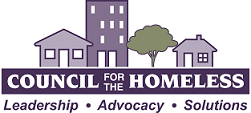
A Young Mother’s Quick Path to Stability and Safety By Nneka D. Coxeff Alivia, a single mother, found herself living in her car for months, struggling to provide for her young daughter while trying to make ends meet. Despite working...

Terrell Berry Discusses the Future of Council for the Homeless By Nneka D. Coxeff I recently sat down with Terrell Berry, our newly hired chief impact officer, to discuss his role and vision for the future. This position was created...

On Dec. 21, we mark the longest day of winter and memorialize those we have lost while unhoused at our local Homeless Persons Memorial Day gathering. Events such as this happen nationwide in many cities, towns and hamlets, honoring those...

Cristian Madrigal is driven by a passion for addressing the housing crisis in our community. “It’s always been the work I’ve wanted to be a part of, and there’s a big need in our community for housing resources. I want to do my part to help my community as best as possible,” he shares.
Since joining CFTH in July 2024 as a Housing Coordinator, Cristian has directed his dedication to impactful work through the Clark County Jail Reentry Program. The Reentry Program provides voluntary resource referral and connection to eligible incarcerated people prior to release from jail, through collaboration with local organizations and nonprofits. These resources, including housing assessments facilitated by CFTH, lay the groundwork for a safe and stable community.

November marks the three following annual awareness campaigns that have significantly impacted our community: National Homelessness Awareness Month, National Youth Homelessness Awareness Month, and National Hunger and Homelessness Awareness Week.
● In the U.S., 37.2 million people live below the poverty line.
● 44 million people are at risk of suffering from hunger.
● 1 in 6 children live in poverty.
● And over 4.2 million youth experience homelessness a year in the U.S.
Writing this blog gives me hope, though, that the staggering numbers I listed above won’t be forever and that we can come together as a community to lower the number of adults, children, and the elderly living in poverty and unhoused. I want to focus on youth homelessness and the importance of meeting our children, youth, and young adults head-on to solve this problem so that it won’t lead to lifelong impacts on their emotional health.

As Elections approach, it is important to know that both housed and unhoused Clark County residents can vote! The Washington state elections are coming up on Tuesday, November 5, 2024, and it’s important to register and vote in the Primary. Elected policymakers have a big influence on homelessness, and it’s important to share your voice.
A person can register to vote and vote in person at the Clark County Elections office located at 1408 Franklin Street, Vancouver. The office is open 8:00am to 5:00pm, Monday through Friday. Even if a person does not have a traditional residential address, they can still register to vote! A residential address is the physical location where one spends most of their time.
On a voter registration form, a person can use the address of a shelter or park or the location of a vehicle, intersection, or other identifiable location that they consider their current residence, even if it’s not a traditional residential address. This location is required and will be used to determine which precinct a person will vote in.

Austin was happily working as a caregiver and was living with his wife and children. However, following a series of significant life changes, including divorce, health issues with his daughter, and his sister’s passing, Austin faced emotional and financial hardships. He had to sell his home and downsize to an apartment. Despite these setbacks, his dedication to his children remained unwavering. When he could no longer afford his rent, Austin moved into an RV and gave his spare money to his ex-wife and children, ensuring that his children had a stable place to stay with their mother.

Meet the Romero family – Roberta, a devoted mother, and her sons Isaiah, Jayden, and Donovan. Roberta and her sons resided in New Mexico but found themselves in unsafe living conditions and facing eviction. Forced to leave behind their familiar surroundings due to escalating violence in their neighborhood, they made the move to Vancouver in 2023 to live closer to family and pursue work and school.
Once in Vancouver, their expected living situation fell through. They found themselves in a new city without a place to call home. The Romeros secured temporary shelter in modest motel rooms while they navigated the complexities of job hunting. Roberta shares, “ We were so nervous about not knowing where we were going to end up sleeping. I didn’t want to have my kids in the street.”

Council for the Homeless has been awarded a $5 million competitive grant from the Bezos Day 1 Families Fund. The funding will help Council for the Homeless and its partners end literal family homelessness (families living in a car, shelter or outside.) The funding also will strengthen solutions and reduce the number of families that are couch-surfing or doubled up — the definition under the McKinney-Vento Homeless Assistance Act, which ensures support for students without a permanent home.

Tell us a little bit about Access Architecture’s mission.
We believe, and studies show, that humans need connection. When we don’t have positive connections in our lives, there is a direct correlation to negative health outcomes. Access Architecture’s mission is to use design for good and to create places that help people create positive and meaningful connections.
What’s one thing you want the community to know about Access Architecture’s work?
We’re passionate about having a real and positive impact on our community. We do this through our community-based design work, community engagement, and volunteer efforts.










